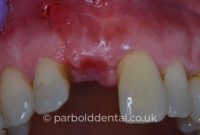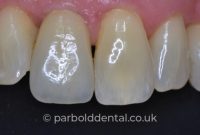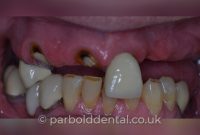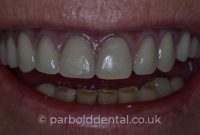Don’t Let Missing Teeth Affect Your Confidence
There can be a great many ways that losing a tooth, or teeth, can affect our lives; from what we eat to how we look and even the functionality of your remaining teeth. There’s also a number of reasons why we may lose teeth and it’s not all to do with bad dental hygiene.
Reasons for losing teeth
Losing teeth isn’t something that just happens as we get older, however the impact on our confidence can be more significant as we struggle with other signs of ageing.
The leading cause of tooth loss in over 40s is gum inflammation and infection (gum disease). Ways to combat this include making sure you brush your teeth twice a day, flossing or using interdental brushes each day to clean between your teeth, replacing your toothbrush regularly and having frequent check ups (especially if you have type 2 diabetes or are pregnant). Smoking can also contribute towards gum disease.
Other factors that can contribute to tooth loss in adults include physical trauma from an accident, untreated cavities leading to tooth decay and it can also be a hereditary condition.
How can losing a tooth affect me?
First of all, if you have noticed a tooth becoming loose or your gums have started to bleed when you brush your teeth, then we highly recommend seeing your dentist as soon as possible so they can determine the underlying problem and put a treatment plan in place.
So, what problems might you face if you lose a tooth?
From a functional point of view, you may experience problems chewing food because your jaws may not come together as they did when you bite down. You might also experience pain as a result of this new, improper bite.
Other teeth may start to move around and tilt in the direction of the gap which can lead to problems in cleaning. The gaps may also experience a build up of plaque or food particles leading to more cavities and infections.
Depending on the tooth that you lose, your speech could be affected and any existing gaps could become more pronounced.
If that isn’t enough, it’s more than likely that losing a tooth will affect your confidence, especially if it’s towards the front of the mouth where it is more noticeable.


The sudden change in appearance, particularly if you have a wide smile, can impact on simple things like laughing with your family or smiling for pictures.
You may also discover that you can no longer enjoy some of your favourite foods that require more effort to bite and chew such as steaks, hard fruits and nuts, cereals and crusty breads.
It’s not simply the missing tooth and gapping that can affect your ability to eat some foods. As mentioned, your remaining teeth will gradually move or tilt into the new empty socket and this can affect how they function.
Depending on the tooth that you have lost, you might find your teeth can no longer cut, slice or chew properly. If this carries on, or you start to experience pain, then you might find yourself resorting to more manageable foods that can be mashed with your tongue or are easy to swallow.
Restricting your diet to this extreme may mean that your body becomes depleted of the essential nutrients it needs to keep you healthy and you could develop digestive problems as your tongue and teeth won’t be working as well together to stimulate the saliva that helps food enter your digestive system.
How to get your confidence back after losing a tooth
Whether you have just lost a tooth or are considering replacing dentures that you’ve had for a while, dental implants could be the answer for you.
Dental implants are more reliable than dentures as they can last up to 10 years if they’re looked after properly and they don’t need to be removed when you’re eating or sleeping.
It’s a much simpler process for you as well. A small metal screw will be placed into your jaw which allows crowns, dentures or bridges to be fixed to them. There’s no need to carry out work on neighbouring teeth either.


If using a crown, it will be constructed to match the colour and shape of your existing teeth which provides maximum comfort and confidence when it comes to smiling and eating so you won’t be stuck eating soft foods for the rest of your life!
The small screw will gradually fuse to your jawbone, meaning it will be strong and far more reflective of a real tooth.
Opting for a dental implant will also prevent bone loss in the future, which can lead to a change in the shape of your face, making you look older. This happens because your jawbone actually shrinks when you lose a tooth as it’s no longer stimulated by the root of the tooth…an implant will stop this from occurring.
Can anyone have dental implants?
As with most procedures, dental implants aren’t suitable for everyone.
If you have diabetes which isn’t easily controlled or you have received radiotherapy around the jaw area, you may not be eligible for the treatment.
The same goes if you don’t have enough natural bone left in your jaw to support the implant. If this is the case, then you may need additional treatments such as a bone graft in order to provide an adequate foundation for the new tooth.
We also choose not to treat smokers as the chances of implant failure are raised significantly.
How can smoking affect dental implants?
There are a number of ways in which smoking can affect the success of a dental implant, long term smokers may have bone loss (a recognised effect of smoking) and this causes issues as we have discussed previously in this blog.
Also, it’s been proven that nicotine constricts blood vessels, which slows down the healing process. This means that it can take longer for an implant to fuse into the jawbone, and the longer this process takes, the higher the chance of failure.
Saliva also plays a part, cigarette use slows down the production of saliva, without which bacteria and plaque can collect in the mouth and cause cavities, gum disease, and other oral infections.
If this is left untreated then gum disease will end up attacking the bone structure that supports the implants.
If you’re considering dental implants, then get in touch with us and we’ll book you in for a consultation where your dentist will assess your suitability for the procedure and give you a personalised treatment plan.
You can also check out some of our previous dental implant work as well as seeing how the procedure is carried out here.
 CONSULTATIONS
CONSULTATIONS
